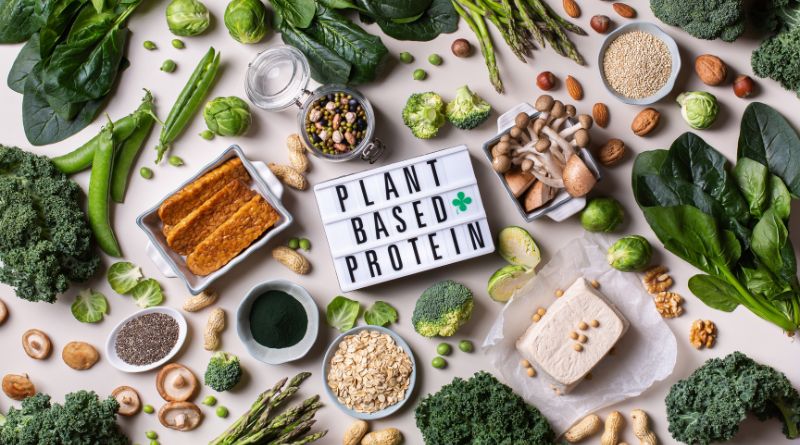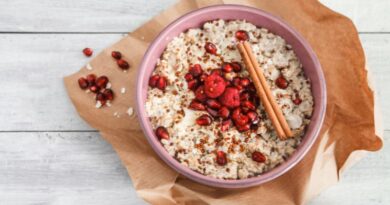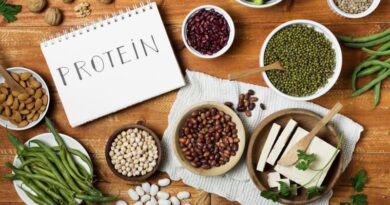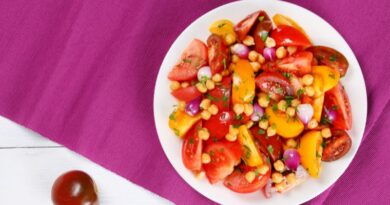In the quest for a balanced and nutritious diet, the importance of protein cannot be overstated. While the spotlight often falls on meat and dairy as primary protein sources, a plethora of nutrient-packed vegetables also boast impressive protein content. This blog post delves into the world of plant-based protein, unveiling the seven healthiest high protein vegetables that can elevate your nutritional intake.
From the green goodness of spinach to the versatile legume family, these veggies not only pack a protein punch but also bring a host of other essential nutrients to the table. Whether you’re a committed vegetarian or simply looking to diversify your protein sources, exploring these vegetable powerhouses can contribute to a wholesome and plant-centric approach to nourishing your body.
Top Healthiest High Protein Vegetables
In this blog post, we will explore the seven healthiest high-protein vegetables recommended by nutritionists. These vegetables not only provide a good amount of protein but also offer additional nutritional benefits such as fiber, vitamins, and minerals. By incorporating these vegetables into your diet, you can meet your protein needs while enjoying the numerous health benefits they provide.
1. Lentils

Lentils are an excellent source of plant-based protein, packing around 18 grams of protein per cup when cooked. They are also rich in fiber, iron, and various vitamins.
Lentils stand out as a vegetarian’s protein powerhouse, presenting an impressive protein content that rivals many meat-based sources. Beyond their protein prowess, lentils bring an additional layer of nutritional excellence with a substantial dose of dietary fiber. This combination not only supports muscle health but also aids in digestive well-being, making lentils a versatile and beneficial addition to any plant-centric diet.
Moreover, lentils boast a generous supply of iron, a vital mineral crucial for energy production in the body. Incorporating lentils into your meals not only satisfies protein needs but also contributes to overall nutritional balance, offering a delicious and plant-based solution for those seeking a protein-packed and energizing dietary choice.
Whether simmered into hearty stews, tossed into vibrant salads, or fashioned into flavorful lentil patties, these legumes are a versatile canvas for creating nutritious and satisfying dishes.
Quick Link: 6 Cooked Vegetables Healthier Than Raw
2. Chickpeas (Garbanzo Beans)
Chickpeas offer approximately 15 grams of protein per cup when cooked. They are versatile and can be used in a wide range of dishes, such as hummus or salads.
Chickpeas, or garbanzo beans, emerge as culinary chameleons, effortlessly adapting to a myriad of dishes and cuisines. Beyond their versatility, these legumes are celebrated for their impressive protein content, making them a sought-after plant-based protein source for vegetarians and vegans alike. However, chickpeas don’t stop at protein; they come packed with a significant dose of dietary fiber.
This dual benefit makes them a nutritional powerhouse, supporting not only muscle health but also contributing to digestive well-being. Whether tossed in salads, blended into creamy hummus, or featured in hearty stews, chickpeas offer a delicious and wholesome addition to a diverse range of culinary creations.
Their robust nutritional profile, coupled with their adaptability, positions chickpeas as a pantry staple for those seeking a plant-centric diet rich in protein and digestive-friendly fiber.
3. Edamame
Edamame, young soybeans, are a protein powerhouse with about 17 grams of protein per cup when cooked. They are a great snack or addition to stir-fries.
Edamame beans, the vibrant green gems of the soybean family, emerge as a delightful and nutritious source of plant-based protein. Whether relished as a tasty solo snack or seamlessly integrated into vibrant stir-fries, these young soybeans deliver an impressive protein punch, making them a prized choice for those embracing a plant-centric lifestyle. Beyond protein, edamame beans contribute a wealth of other essential nutrients to your diet. Rich in folate, they play a role in supporting cell division and overall cellular health.
Additionally, their vitamin K content adds a beneficial touch, contributing to bone health and blood clotting regulation. Versatile and nutritious, edamame beans stand as a delicious testament to the potential of plant-based foods in providing both protein and a diverse array of vital nutrients.
Whether enjoyed on their own or as a flavorful addition to various dishes, edamame beans offer a tasty and wholesome option for those seeking a protein-packed and nutrient-rich snack or meal component.
4. Black Beans
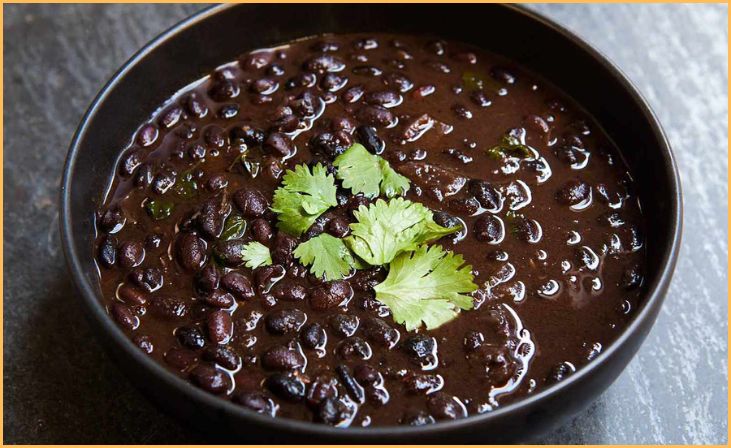
Black beans provide roughly 15 grams of protein per cup when cooked. They are a staple in many cuisines and are known for their protein and fiber content.
Black beans, hailed as a nutritional powerhouse, have earned their place as a culinary cornerstone in Latin American and Mexican cuisines. Beyond their rich, earthy flavor, these beans are celebrated for their exceptional protein and fiber content. This dynamic duo not only provides a satisfying and hearty quality to meals but also contributes to a sense of fullness, making black beans an ally for those mindful of their dietary choices.
The protein-fiber combination in black beans extends its benefits to digestive health, supporting a well-functioning digestive system. Whether crafted into savory stews, folded into zesty salads, or mashed into flavorful dips, black beans offer a versatile and nutritious foundation for a range of dishes.
As a plant-based protein source, they stand tall in promoting satiety and digestive well-being, making them a delicious and wholesome choice for those seeking a fulfilling and nutrient-packed addition to their meals.
5. Green Peas
Green peas contain about 8 grams of protein per cup when cooked. They are also a good source of vitamins like vitamin C and vitamin K.
Green peas, those petite and vibrant pearls, bring more than just visual appeal to your plate—they’re a delightful nutritional powerhouse. Packed with protein, they offer a plant-based boost to support muscle health and overall well-being. Yet, their benefits extend beyond protein, as green peas are a rich source of essential vitamins.
With a generous serving of vitamin C, they become champions in promoting immune health, contributing to your body’s defense against illnesses. Additionally, green peas boast a notable supply of vitamin K, playing a crucial role in both blood clotting and maintaining bone health.
Whether enjoyed as a crisp side dish, blended into creamy soups, or tossed into refreshing salads, green peas stand as a versatile and nutrient-rich addition to a balanced diet, showcasing their ability to deliver both protein and a spectrum of vital vitamins.
6. Spinach
Spinach is a leafy green vegetable that offers about 5 grams of protein per cooked cup. It’s not as protein-rich as some other options, but it’s a nutrient-dense choice.
Spinach, the verdant virtuoso of leafy greens, may not steal the spotlight in protein content, but its nutritional prowess is unrivaled. Brimming with essential vitamins and minerals, this nutrient-dense green stands as a powerhouse in promoting overall health. A generous dose of vitamin A contributes to eye health and immune function, while ample vitamin K supports blood clotting and bone health.
Folate, another key player found in spinach, plays a crucial role in cell division and DNA synthesis. Despite its mild flavor and tender texture, spinach emerges as a robust ally for those seeking to enhance their nutrient intake. Whether featured in crisp salads, blended into vibrant smoothies, or sautéed as a savory side, spinach offers a versatile and delicious means to fortify your diet with a spectrum of vital vitamins and minerals.
Also check: Top 10 Nutritious Vegetables Recommended by Nutritionists
7. Broccoli
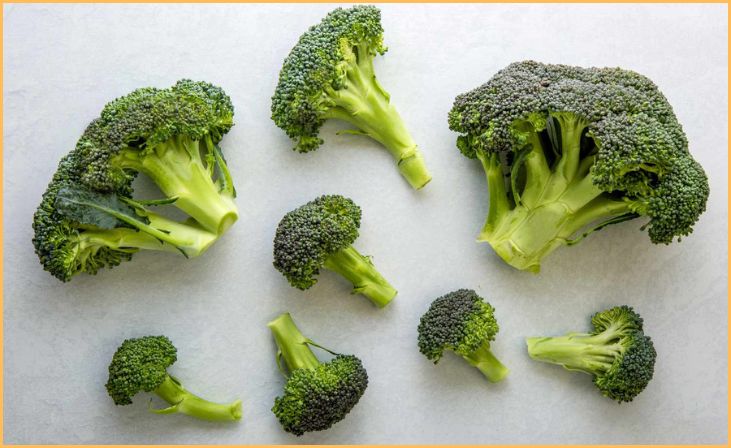
Broccoli is another green vegetable with a respectable protein content of around 3 grams per cooked cup. It’s also packed with vitamins and minerals.
Broccoli, the cruciferous champion, not only stands out for its delightful green florets but also for its noteworthy protein content, especially given its modest calorie profile. Beyond its protein prowess, broccoli emerges as a nutritional powerhouse, delivering an abundance of essential vitamins and minerals. Vitamin C, a prominent presence in broccoli, lends its antioxidant might, contributing to a robust immune system and healthy skin.
Vitamin K, another jewel in broccoli’s nutrient crown, supports blood clotting and bone health. The inclusion of minerals such as potassium and folate further enhances its nutritional profile, promoting overall well-being. Whether steamed to retain its crispness, roasted to intensify its flavor, or tossed into hearty salads, broccoli offers a tasty and versatile means to incorporate a range of vital nutrients into your diet.
Its balance of protein, vitamins, and minerals makes it a standout choice for those seeking both nutrition and flavor in their meals.
Bottom Line
Incorporating high protein vegetables into your diet is a strategic move towards a well-rounded and plant-focused eating plan. The seven vegetables highlighted in this blog post not only deliver on the protein front but also bring a symphony of vitamins, minerals, and antioxidants to support your overall health. From promoting muscle health to aiding in weight management, these veggies offer a multitude of benefits. Embracing a diet rich in plant-based proteins is not only a nutritious choice but also an environmentally sustainable one. So, whether you’re crafting vibrant salads, hearty stews, or inventive plant-based dishes, these high-protein vegetables can be the star players in your culinary repertoire.
FAQs
Absolutely! While vegetables might not match the protein density of meat, many plant-based options, especially the ones highlighted in this post, offer substantial protein content. By incorporating a variety of these high-protein vegetables into your meals, you can easily meet your protein needs.
Yes, all the vegetables mentioned are plant-based and suitable for both vegetarians and vegans. They provide a valuable protein source for those who choose to exclude or limit animal products from their diet.
These vegetables are incredibly versatile. You can enjoy them in salads, stir-fries, soups, or even as the main course. Experiment with different cooking methods to find what suits your taste preferences.
Yes, incorporating high-protein vegetables into your diet can contribute to weight management. Protein helps increase satiety, making you feel full for longer periods, which can aid in controlling appetite and supporting weight loss or maintenance.

